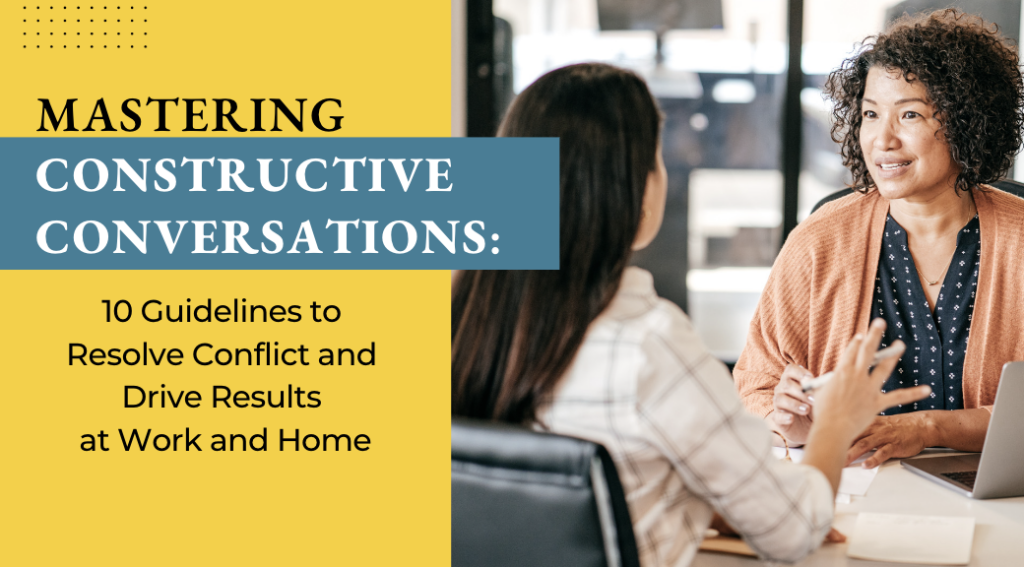
In Stephen Covey’s book, “The 7 Habits of Highly Effective People,” he emphasizes the importance of “Beginning with the end in mind.” The Constructive Conversation guidelines draw inspiration from Covey’s second habit but enhance it by providing a practical framework for implementation. Often, many conversations are driven by problems, accompanied by feelings of frustration, anger, or blame, serving as the initial impetus for engagement.
See Guidelines In Action
In the following webinar video, Patty Jackson, the creator of the 10 Constructive Conversation Guidelines, shares effective utilization of her Clear Inner Focus Table. As you will see, this powerful tool empowers individuals to address and dispel frustrations and fears associated with problems, enabling them to approach conversations with newfound confidence.
The dedicated application of this tool to sculpt clear and purposeful conversations, in combination with her remaining nine conversation guidelines, individuals navigate challenges and seamlessly pivot them into opportunities for personal, professional and relationship growth.
Listen to the Constructive Conversation Guidelines and See How The Clear Inner Focus Table (C.I.F.T.) is used:
Constructive Conversations Guidelines
- Begin conversations with your desired result in mind.
- Do not begin a conversation when you are upset.
- Use The Clear Inner Focus Table™* to clear your stress and get focused on the end-result you want.
- Schedule time for a Constructive Conversation whenever you want to build connection, work on an issue, or achieve an objective. (Set aside time for the conversations others schedule with you.)
- Communicate to gain understanding, find a solution, and move forward.
Do not:
- Communicate to prove right and wrong.
- Communicate to get what you want right away.
- Assume you know what the other person is thinking.
- Focus on kind or solution-based thoughts about yourself and others.
- Notice what you are thinking about yourself and others. If you find yourself grumbling about others or dwelling in the past problems, use the Forgiveness (Can’t You See) Painful thoughts affect your behavior & filter what you see.
- Use your words to speak kind thoughts out loud.
- Be responsible. Expect others to be the same.
- Tend to the things you are responsible for. Give others reasonable time and space to do the same.
- For clarity, use the Define Your Lane of Responsibility Tool*.
- Let others achieve results their way. If their way breaks an agreement or impedes your ability to take care of yourself or enjoy your life, have a Constructive Conversation. Communicate to gain understanding and create a win-win solution.
- Take the time to make plans you agree on
– win-win solutions. Be committed and stick to the plans you make or communicate and renegotiate a new plan before changing directions. - Be accountable. Follow through with your plans and agreements. Hold others accountable to do the same. The Define Your Lane of Responsibility Tool* helps provide the clarity you may need to do this.
TROUBLESHOOTING:
Expect mistakes. Embrace them as opportunities to grow individually and together. When mistakes are made:
- Forgive. Forgive yourself for not knowing and doing better back then or for putting yourself in the situation. Forgive others for not knowing a better way at that time either. Focus on what you learned and grow forward, applying what you now know.
- Make amends. Address the cause of your hurtful behavior – your thoughts, feelings, habits, or beliefs behind your actions. The Clear Inner Focus Table™* can help you do this. Practice doing things differently. This rebuilds trust in yourself and others.
- If someone has hurt you repeatedly or deeply, it is important to identify what you need to believe that they have addressed the root cause of their behavior, and then communicate these needs to them.
- Rebuilding trust takes repetition and time.
MAINTENANCE:
- Practice Self-Care. Knowing what you need and taking care of it is necessary to sustain your energy, remain solution-oriented, and be present in life. When you attend to yourself, you can optimize your life experiences. Looking after yourself is not only an act of self-love but also essential for overall health and wellbeing on all levels – mental, emotional, physical, spiritual and relationship wise.
*All tools bolded and underlined in these guidelines are free to you and can be found at:
https://clearinnerfocus.com/resources/client-resources/
password: normalhumanstuff





